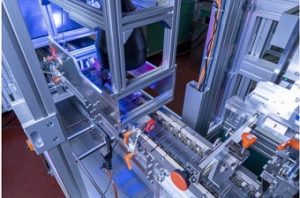
Combating the COVID-19 (coronavirus) pandemic is at the top of the global agenda and providing vaccines to populations around the globe means providing around 8 billion doses – with only one for every person in the world. In addition to the availability of the vaccine, a decisive factor in the race against time is the disposability of the glass vials.
To ensure that the mass vaccination against the coronavirus does not fail because of the container, the producers of the vials are massively ramping up their production so as not to become the proverbial bottleneck in the supply chain. However, medical-grade vaccine vials are not standard glass tubes. Whether rolled-rim bottles, threaded bottles or ampoules, they are all made of the special glass borosilicate and require customised production lines. The glass must be resistant to a wide range of chemicals and temperature changes and must not contaminate medicines, for example.
Any interaction between the container and the liquid inside must be prevented, as any chemical interference could affect the vaccine. Even the smallest scratch, crack or fissure can render an entire batch unusable, contaminate the line during the filling process or even lead to a machine standstill.
The demands on manufacturers are enormous. It is not only a matter of producing large quantities quickly, but also of maintaining particularly high quality standards. Industrial cameras from IDS Imaging Development Systems GmbH in Germany are currently becoming key components in demand. In an intelligent multi-camera system for the quality control of vaccine bottles from Isotronic GmbH, they take care of image acquisition.
When increasing production capacities, efficient solutions that can be integrated quickly are in demand. The ‘VialChecker’ developed by Isotronic GmbH meets this growing demand exactly. “Our system enables high-speed processing and is usually used at several points in the production line,” explains Gregor Fabritius, Managing Director at Isotronic GmbH.
The system works with up to eight cameras per unit, the camera models vary depending on the requirements of the respective control task. For example, they observe the laterally rotating tube glass or the glass bottom and provide high-resolution images.
“The IDS cameras capture at least 20 images per rotation, allowing up to 120 vials per minute to be inspected for dimensional accuracy or surface condition with very high precision,” emphasises Valentin Mayer-Eichberger, Chief Operating Officer (COO) at Isotronic.
Accuracy is up to 0.01 millimetres for dimensional testing. Defects such as cracks, scratches, chips, inclusions or stains, on the other hand, are detected with an accuracy of 0.1 square millimetres thanks to the powerful cameras. Intelligent software enables accurate fault description analysis and classification.
Experts estimate that global demand for vaccine vials will further increase by one to two billion over the next two years. To ensure that this valuable liquid is protected accordingly, automatic, high-performance testing systems are more in demand than ever to guarantee the immense demand for quality.
“We think that we are meeting a growing demand here with our cameras and are pleased to be able to make a corresponding contribution to combating the pandemic,” explains Jan Hartmann, Managing Director at IDS Imaging Development Systems.











